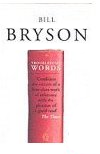

| Book of the Month | ||
 |
Troublesome words |  |
Penguin
Author: Bill Bryson
242 pages + notes
£8.99
ISBN 0141 00135 6
Many people will know Bill Bryson as a writer of extremely funny travel books. As a journalist and as a writer Mr Bryson is fascinated by language, and has written two other books on the subject; Mother Tongue and Made in America. This book is different from the others, being a dictionary of words which the writer, and many other users of the language, have found troublesome. The original book appeared 20 years ago, but this edition has been revised considerably. This is because, as Mr Bryson comments, not only is 'proper' English usage changing all the time, but he is constantly finding out more about how to use English. Indeed, he suggests that a better title for the book might have been Even More Things in English Usage That the Author Wasn't Entirely Clear about Until Quite Recently.
Most of the book is taken up by the dictionary, though there is a short introduction at the beginning. At the end there is a guide to pronunciation (an excellent idea since the English abuse their pronunciation as much as they abuse their vocabulary), a glossary (a description of technical words, for those people who do not know what - for instance - a dangling modifier is), and a bibliography of about fifty other books. There are no illustrations; in fact the book is plain text throughout, which is one of the reasons for its pleasantly low price.
Each of the dictionary entries is clear, and the differences between words like 'saccharine' (having a sugary taste) and 'saccharine' (a sugar replacement) are explained clearly. The writer gets annoyed by redundant words e.g. 'his usual habit' -(if it was not usual it would not be a habit) and 'past history' (since all history is by past). These opinions are sometimes strongly and amusingly put. For example he says that anyone spelling 'barbecue' as 'barbeque' or (even worse) as 'bar-b-q' is not fit for unsupervised employment.
Who is this book for? Anyone, from an advanced English student to a full-time professional writer, will get a lot from this book. It is lighter than a traditional English grammar, and opening the book at random and reading a few entries is a good way of passing a few minutes and learning something new at the same time. You can also find examples of bad grammar from professional writers and national newspapers to make you feel better about your own mistakes.
Verdict: Excellent and entertaining, but not essential
Assessment 9/10